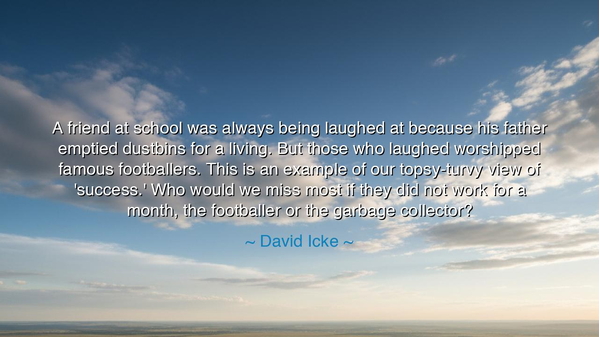
A friend at school was always being laughed at because his father
A friend at school was always being laughed at because his father emptied dustbins for a living. But those who laughed worshipped famous footballers. This is an example of our topsy-turvy view of 'success.' Who would we miss most if they did not work for a month, the footballer or the garbage collector?






Host: The living room was quiet, the soft glow from a nearby lamp casting a gentle light over the space. Outside, the world was still, with the occasional rustle of leaves in the evening breeze. Jack sat on the couch, looking out the window, his mind clearly absorbed in thought. Jeeny sat across from him, her tea cooling in her hands, watching him with quiet curiosity, sensing that something deeper was on his mind.
Jeeny: (breaking the silence, her voice thoughtful) “You know, David Icke once said, ‘A friend at school was always being laughed at because his father emptied dustbins for a living. But those who laughed worshipped famous footballers. This is an example of our topsy-turvy view of 'success.' Who would we miss most if they did not work for a month, the footballer or the garbage collector?’”
(She paused, her voice full of curiosity as she looked at Jack.) “What do you think he meant by that? About our view of success and the roles people play in society?”
Jack: (pausing, his voice reflective as he processed the words) “I think he’s pointing out how we’ve come to value status and fame over the things that actually keep society functioning. We often put athletes, celebrities, and people with visible wealth on a pedestal, while we overlook the essential, yet less glamorous, roles like sanitation workers, teachers, and healthcare professionals. In reality, though, the garbage collector is the one whose absence would be felt the most — the world would fall apart much more quickly without them than without a footballer.”
Jeeny: (nodding slowly, her voice steady) “Exactly. It’s all about how we assign value to certain jobs based on how much attention they get or how much money they bring in. But real success should be about the contribution to society, not just visibility or fame. If people didn’t show up to clean the streets, things would start falling apart very quickly. Yet, we often ignore those who make such an important difference, focusing instead on the flashy, high-profile jobs.”
Jack: (smiling faintly, his tone lightening a bit) “It’s funny, isn’t it? The way we worship celebrity. We get caught up in the idea that success is about fame, wealth, and status. But when we step back and think about it, the people who make the biggest impact on our everyday lives often go uncelebrated.”
Jeeny: (gently, her voice full of understanding) “Yes, it’s a reminder that success isn’t just about the spotlight. It’s about the foundation that holds everything together. Without those ‘invisible’ roles — the ones we often take for granted — society wouldn’t function as smoothly. The real heroes are often the ones who aren’t chasing fame or fortune but who do essential work with dedication.”
Jack: (nodding thoughtfully, his voice growing more introspective) “It’s about recognizing that the most valuable contributions aren’t always the most glamorous. What if we all valued those jobs as much as we valued athletes and entertainers? Society would probably be a lot more grounded.”
Jeeny: (smiling softly, her voice calm) “Exactly. Success shouldn’t be defined by fame or wealth alone. It should be about the work that makes a real difference in the world, even if it’s not visible on the surface.”
Host: The room seemed to settle into a quiet understanding, the weight of Icke’s words hanging in the air like a gentle reminder. Society often equates success with fame and wealth, but true success, as both Jack and Jeeny realized, lies in the everyday contributions that keep the world moving — the jobs we often overlook but could not live without.
Jack: (softly, with a sense of clarity) “I think that’s the key — recognizing that success isn’t about what’s flashy, but about what matters. The work that keeps society running is just as important, if not more so, than the work that gets the most attention.”
Jeeny: (nodding, her voice full of quiet conviction) “Exactly. We need to value all contributions, not just those that come with fame or money.”
Host: The night outside deepened, but inside, Jack and Jeeny shared a quiet realization that success wasn’t about the visible or the glamorous. It was about the everyday roles that kept everything running, the essential work that often goes unnoticed but is felt in every part of society. True success, they understood, comes from making a difference in the lives of others, regardless of the spotlight.






AAdministratorAdministrator
Welcome, honored guests. Please leave a comment, we will respond soon